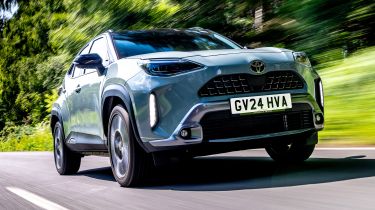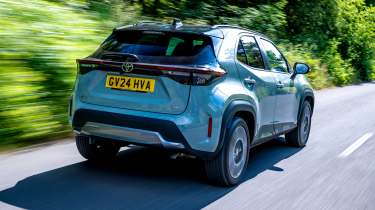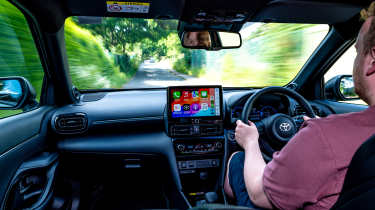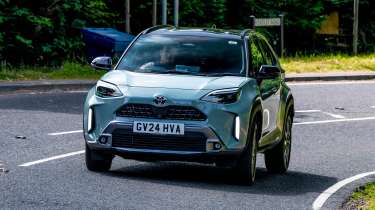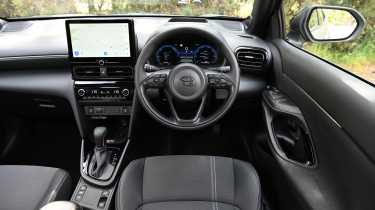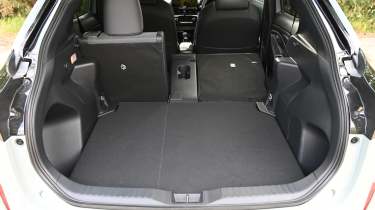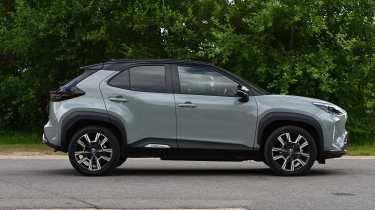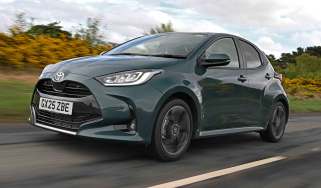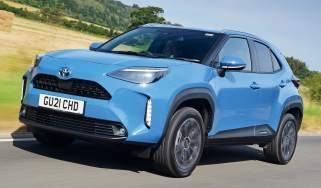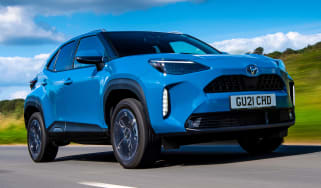Toyota Yaris Cross review
The Toyota Yaris Cross is a sensible, efficient, and appealing small SUV

Our opinion on the Toyota Yaris Cross
The Toyota Yaris Cross delivers where it matters most for buyers considering a small SUV. Of course, there’s the benefit of the higher driving position with better visibility, and slightly more practicality than the Yaris supermini upon which it is based, but the Yaris Cross is also competitively priced compared to its rivals, is easy to pilot around town and offers excellent real-world economy courtesy of its efficient hybrid system.
Yes, it feels like Toyota’s bean counters have had the last word in certain areas of the cabin, and some of its rivals are better for rear space. However, it’s a good-looking little car offering a generous level of standard kit and a round of updates brought benefits up and down the range, including bigger touchscreens. Plus buyers on a budget needn’t worry because overall running costs should be pretty low.
About the Toyota Yaris Cross
The Toyota Yaris Cross is the Japanese brand’s entry into the jam-packed small SUV and, as the name suggests, it’s based on the regular Toyota Yaris and uses the same 'self-charging hybrid' technology as the frugal little supermini. This system is at its best when driving in and around town, on shorter, urban commutes or competing in the hustle and bustle typical of the daily school run.
Used - available now

2021 Toyota
Yaris Cross
29,524 milesAutomaticPetrol1.5L
Cash £20,149
2021 Toyota
Yaris Cross
58,187 milesAutomaticPetrol1.5L
Cash £17,824
2021 Toyota
Yaris Cross
32,985 milesAutomaticPetrol1.5L
Cash £19,854
2024 Toyota
Yaris Cross
28,620 milesAutomaticPetrol1.5L
Cash £19,335Since its introduction in 2021, the Yaris Cross has been a smash hit across Europe – even by small SUV standards, which generally fly out of showrooms faster than Marvel releases new superhero movies.
Toyota clearly didn’t want to mess with that success when upgrading the Yaris Cross in 2024, because rather than a wholesale facelift, the brand focused on a few carefully selected improvements. This was a bold move, especially considering that many key rivals received far more significant overhauls.
We’ve put this small SUV through its paces since it first arrived in the UK, although it didn’t quite manage to woo our expert road testers when faced with the Honda Jazz in our real-world twin test. It was a narrow victory for the Jazz, though, as the Honda is just that bit cheaper to run. We also spent six months with a Yaris Cross in Design trim as part of our long-term test fleet. This allowed us to truly find out what this little SUV is like to live with, and it was a very trouble-free, if unexciting experience.
Toyota Yaris Cross prices and latest deals
The Yaris Cross is one of the cheaper models in Toyota’s line-up, with the entry-level Icon model starting from around £25,500. There are four trim levels in total, with the range-topping GR Sport commanding the highest starting price of around £31,300.
If you’d like to save an average of £2,400, you can build your brand-new Toyota Yaris Cross through the Auto Express Buy a Car service. We also have a number of new Yaris Cross models in-stock, along with a selection of used Toyota Yaris Cross deals.
Engines, performance & drive
Pros |
|
Cons |
|
With a focus on efficiency rather than outright performance, the Toyota Yaris Cross doesn’t offer too much in the way of sprinting ability. Acceleration times are average at best, and the combination of a 1.5-litre three-cylinder petrol engine, a small electric motor, and a CVT automatic transmission won’t excite keen drivers in the same way a manual Ford Puma would. If you push on a bit, the petrol engine in the Yaris Cross provides a typical three-cylinder thrum, which some might think sounds a little more interesting than a droning four-cylinder.
| Model | Power | 0-62mph | Top speed |
| Toyota Yaris Cross 1.5 Hybrid Design | 116bhp | 11.2 seconds | 106mph |
| Toyota Yaris Cross 1.5 Hybrid 130 Excel | 130bhp | 10.7 seconds | 106mph |
| Toyota Yaris Cross 1.5 Hybrid 130 Excel AWD | 130bhp | 11.3 seconds | 106mph |
Performance, 0-60mph acceleration and top speed
The Toyota Yaris Cross uses a ‘self-charging’ hybrid system that produces 114bhp and 141Nm of torque in lower-spec cars, resulting in a 0-62mph time of 11.2 seconds for the front-wheel drive versions. All-wheel drive is an option, but the additional weight slows things down to 11.8 seconds.
Top-spec Excel and GR Sport models boast a more powerful setup with 129bhp and 185Nm, which trims the 0-62mph time down to 10.7 seconds, or 11.3 seconds if you want all-wheel drive. The extra power comes from an uprated e-motor, which makes a noticeable difference around town, feeling quicker away from the lights. We also noticed the petrol engine didn’t seem to chime in as often, helping improve fuel economy. When the engine does kick in, it sounds a little strained when you put your foot down to join the motorway or overtake, though once you ease off, everything settles down.
Town driving, visibility and parking
Toyota has identified that Yaris Cross buyers will most probably live in more built-up, urban areas, so it’s important that the small SUV is comfortable and easy to pilot around town. Has it succeeded? For the most part, yes. The Yaris Cross can run on smooth electric power up to 30mph – provided you’re very gentle with the accelerator. When the petrol engine has to kick in, the switchover is barely noticeable as it kicks in to assist in increasing the pace. It’s a good set-up for driving in stop-start traffic for those after an automatic, feeling much less jerky than an auto Citroen C3 Aircross, Peugeot 2008, and Vauxhall Mokka. During our long-term testing of a Yaris Cross, we found the hybrid system did a great job of utilising battery power as much as possible in stop/start traffic.
Country road driving and handling
Around bends, the Yaris Cross is a surprisingly composed and fun little car to chuck around, though ultimately, it isn’t as nimble as the aforementioned Puma. Similarly, while ride comfort is reasonably good at slower speeds, the car is a little bit fidgety on faster roads, and it certainly can’t match the plush ride of the Hyundai Kona.
The GR Sport trim promises sharper steering than other versions and features tweaked suspension to make the Yaris Cross a bit more fun. However, we found the stiffer set-up gives it a fidgety ride at low speeds like a Nissan Juke, and feels a little more harsh over rougher surfaces at speed. The GR Sport does keep body lean in check better than the standard version, but the trade-off isn’t good enough to warrant the further reduction in ride quality.
Motorway driving and long-distance comfort
Toyota has made several changes to improve refinement in the Yaris Cross, including thicker glass for the windscreen and all the side windows. These have helped reduce wind noise, but road and tyre noise are still noticeable at higher speeds.
“Toyota offers a ‘B’ mode to boost engine braking when lifting off the throttle. It’s stronger than the Honda Jazz’s system, but the car’s engine tends to fire up more often in this mode, which cancels out the benefits of the additional energy recovery.” - Alex Ingram, chief reviewer.
MPG, emissions & running costs
Pros |
|
Cons |
|
Low running costs are a particularly strong area for the Toyota Yaris Cross. Along with being relatively cheap to insure and maintaining decent residual values, the petrol-hybrid set-up means that you’ll benefit from superb economy figures and low CO2 emissions.
The Japanese giant claims that the Yaris Cross should return over and above the near 50mpg you’ll typically get from a Ford Puma, with the Toyota hybrid system averaging between 55 and 63mpg, depending on your chosen specification, and whether you’ve opted for front- or all-wheel drive. We lived with a FWD Yaris Cross in Design trim for several months, during which time it returned an average of 64.7mpg, though it indicated much higher figures on several occasions, so Toyota’s numbers certainly seem to stack up in real-world driving. During our time with the Yaris Cross we spent a lot of time driving on the electric motor alone, without any intervention from us telling the car when to switch from electric to petrol power.
| Model | MPG | CO2 | Insurance group |
| Toyota Yaris Cross 1.5 Hybrid Design | 55.4mpg | 115g/km | 14 |
| Toyota Yaris Cross 1.5 Hybrid 130 Excel | 58.9mpg | 109g/km | 15 |
| Toyota Yaris Cross 1.5 Hybrid 130 Excel AWD | 55.4mpg | 115g/km | 14 |
Insurance groups
You shouldn’t need to splash out on insurance cover for the Toyota Yaris Cross. The entry-level Icon model is in group 11 (on the 1 to 50 scale), while all other versions sit in groups 12 to 15.
In comparison, a Ford Puma in Titanium trim sits in group 12, while the petrol Hyundai Kona will be slightly more expensive to insure because it starts in group 14.
Tax
While the Yaris Cross is a pretty eco-conscious car, it can’t come close to fully electric cars when it comes to Benefit-in-Kind (BiK) company car tax savings. Small SUVs like the Hyundai Kona Electric and Ford Puma Gen-E will be better options for those seeking to save the big money here.
All Yaris Cross models are liable for VED road tax, but they do fall short of the £40,000 luxury car tax surcharge, even if you go for the range-topping GR Sport.
Depreciation
Our expert data suggests that after a typical three year or 36,000 mile ownership period, Toyota’s baby SUV will retain between 49 and 54 per cent of its original list price.
This is a very similar outcome to the Ford Puma, which holds on to 47 to 53 per cent. However, the electric Puma Gen-E only manages 39 to 41 per cent.
To get an accurate valuation for a Toyota Yaris Cross, check out our free car valuation tool...
Interior, design & technology
Pros |
|
Cons |
|
The Toyota Yaris Cross sits on the same platform as the Yaris supermini, but being a small SUV it rides higher, has greater ground clearance, and a more rugged look. The black plastic cladding around the wheel arches adds a little extra flavour to its chunky, cross-country credentials, while stylish aluminium roof rails are standard on all but the entry Icon model. You can also specify a black roof in combination with certain body colours to add a little extra personalisation.
As the name suggests, the GR Sport version gives the Yaris Cross a slightly more athletic look, but don’t be fooled into thinking it’s any faster or could be Toyota's answer to the Ford Puma ST, it’s mainly just a few styling changes and some suspension tweaks.
Interior and dashboard design
The cabin of the Yaris Cross is best described as functional because it isn’t particularly exciting.
If you’re after luxuries such as heated front seats and steering wheel, head-up display, JBL sound system, you’ll need to look towards the Excel and GR Sport trim levels. That’s not to say the Icon and Design specifications are poorly equipped; each includes alloy wheels, keyless entry, adaptive cruise control, and a reversing camera.
Materials and build quality
Some of the plastics inside the Yaris Cross can be a little hard and scratchy, but the car does generally feel well-built and uses physical climate controls and simple switchgear that all feel nicely damped.
Infotainment, sat-nav and stereo
Post-facelift models have a nine-inch touchscreen with the Toyota Touch 2 infotainment system, which is relatively simple to navigate, and features wireless Apple CarPlay and Android Auto connectivity. This setup also has some shortcut buttons around the screen, which are handy while driving.
Go for Design trim and above, and the Yaris Cross features a 10.5-inch touchscreen, running Toyota’s latest ‘Smart Connect’ user interface system – the same one found in the Toyota bZ4X and Toyota C-HR. Compared to the other system, it’s sharper, quicker to respond and the menus are easier to navigate, though we still didn’t find it to be quite as intuitive or snappy as the Google-powered tech in the refreshed Renault Captur.
“Inside, there are clear similarities between the Yaris and Yaris Cross. The dashboard is pretty much identical, with the same switchgear, steering wheel, air vents and touchscreen infotainment system.” - Alex Ingram, chief reviewer.
Boot space, comfort & practicality
Pros |
|
Cons |
|
The Toyota Yaris Cross is taller and rides higher than the Toyota Yaris hybrid supermini it shares its underpinnings with, giving the raised driving position many drivers like. It’s a five-seat small SUV, although three across the back seat will be a squeeze and there isn’t a great deal of rear leg room for those travelling in the second row.
Slightly unusually, seatback pockets and underfloor boot storage are only standard on Excel trim and above, and if you want cupholders in the back, you have to upgrade to the Design trim level.
Dimensions comparison | |||
| Model | Toyota Yaris Cross | Ford Puma | Hyundai Kona |
| Length | 4,180mm | 4,226mm | 4,385mm |
| Width | 1,765mm | 1,805mm | 1,825mm |
| Height | 1,595mm | 1,550mm | 1,575mm |
| Wheelbase | 2,560mm | 2,590mm | 2,660mm |
| Boot space | 266/350 litres | 456 litres | 466 litres |
Seats & passenger space
The front seats in the Toyota Yaris Cross offer good support, while standard kit such as a central armrest, a reach and rake-adjustable steering wheel and front cup holders help to make things more comfortable. Step up to mid-range Design trim, and you get electrically adjustable lumbar support – a rarity in this class.
Storage could be better, with the Cross featuring a relatively small boot and little space to keep odds and ends secure in the cabin. The fabric parcel shelf looks cheap, and adds to the feeling that Toyota approached its small SUV with cost-savings firmly in mind.
The rear bench in the Yaris Cross offers enough headroom for anyone around six foot tall, but legroom is in relatively short supply, so taller teenagers and adults probably won’t want to spend much time in the back of the Yaris Cross. They’ll also be disappointed by the lack of any USB charging ports, and access is compromised due to the small rear doors.
There are two sets of ISOFIX child seat mounting points in the back of the Yaris Cross, however, the small door openings and limited space will make it difficult to accommodate bulky child seats.
Boot space
The front-wheel drive Toyota Yaris Cross provides 350 litres of luggage space up to the tonneau cover versus the all-wheel drive version’s 266 litres. Fold the rear seats down, and the load volume expands to 1,097 litres in both variants. It’s worth noting that entry-level Icon cars get a 60:40 split-folding rear bench, while all others get seats that split 40:20:40.
More expensive models (Excel and above) include a false boot floor that can create a flush load area with the load lip and folded back seats. That’s pretty handy because the Yaris Cross has a hefty lip to try and get heavier items over. It’s a shame you can’t add this as an option on other trims, because an adjustable height boot floor is something that’s standard on the Volkswagen T-Cross.
Rivals have the Yaris Cross beat in this area, with the Ford Puma offering 456 litres of boot space. The Renault Captur also provides 422 litres as standard in petrol form, but the ace up its sleeve is its sliding rear bench, meaning you can push capacity to 536 litres when needed.
Towing
Towing capacity is nothing to write home about because no version can lug around more than a 750kg braked trailer, making the 13-pin tow bar option a bit pointless. A Kona Hybrid, meanwhile, can haul up to 1,300kg.
“The Toyota’s large, square boot offers more space than the Honda Jazz’s in five-seat mode, but the lightweight floorboards don’t feel particularly strong, while the fabric load cover is another disappointment. Take it off and it feels like it’ll blow away on a windy day.” - Alex Ingram, chief reviewer.
Reliability & safety
Pros |
|
Cons |
|
Safety experts Euro NCAP originally awarded the Toyota Yaris Cross a maximum five-star crash safety rating when it was first tested in 2021. However, the car was retested in 2025 under a much more stringent regime, and it only managed four stars this time around.
There’s still a good amount of standard-active systems, though, such as adaptive cruise control to keep you a safe distance from the car in front, plus there’s a lane-keeping assist system to help you stay within your lane on the motorway. There’s also road sign assist, which reads the speed limit from road signs, and an autonomous emergency braking (AEB) system to mitigate or prevent collisions with other vehicles and vulnerable road users at low speeds around town.
Toyota Yaris Cross owners voted it as the 41st best car to own out of 50 models in the 2025 Driver Power satisfaction survey. They were particularly pleased with the smoothness and efficiency of the hybrid powertrain, but the infotainment tech left a lot to be desired. The Toyota brand, meanwhile landed a pretty meagre 14th out of 31 brands in the best manufacturer rankings.
| Euro NCAP safety ratings | |
| Euro NCAP safety rating |
Four stars (2025) Five stars (2021) |
| Adult occupant protection |
79% (2025) 86% (2021) |
| Child occupant protection |
85% (2025) 84% (2021) |
| Vulnerable road user protection |
83% (2025) 78% (2021) |
| Safety assist |
76% (2025) 81% (2021) |
Buying and owning
- Best buy: Toyota Yaris Cross Hybrid Design
While the pricier trim levels add in more elements of luxury, we feel that the Toyota Yaris Cross Design strikes the ideal balance between kit and affordability. It may come with the slightly less powerful hybrid powertrain, but efficiency is very much this car’s forte, rather than outright speed. That being said, it’ll cope with motorway speeds without much fuss.
Toyota Yaris Cross alternatives
The Toyota Yaris Cross will appeal to those who only occasionally need to put people in the back, and want a car that’s cheap to run in terms of fuel costs, insurance and depreciation. They’ll also value strong equipment levels with plenty of safety assistance technology. The Yaris Cross is a rarity in the small SUV class that can be had with four-wheel drive, which might be very useful to those who need the additional traction of four-wheel drive in slippery conditions.
It isn’t the most practical small SUV and misses out on some useful practicality features of its rivals, such as the sliding rear seats of a Renault Captur and Volkswagen T-Cross, which allow you to trade boot space for rear leg room if you have taller passengers, or the Megabox in the boot of the Ford Puma for some hidden underfloor storage. The Puma is also much nicer to drive than the Yaris Cross, with greater driver engagement.
There are also established rivals such as the Nissan Juke to consider, or the more premium-feeling Peugeot 2008. The latter can be had with a range of petrol, hybrid, or all-electric powertrains, just like the Hyundai Kona, Kia Niro, and Jeep Avenger.
Toyota Yaris Cross Design: long-term test
Back in 2022, our then news and reviews editor, James Brodie, enjoyed six months of highly economical motoring in a mid-range Toyota Yaris Cross Design. It did everything expected of it and didn’t throw up any surprises in several thousand miles of motoring.
That being said, James didn’t find it to be the most interesting of small SUVs out there, and he wasn’t all that impressed with rear seat accommodation, which could, he thought, be a bit of a problem for families.
Frequently Asked Questions
The Toyota Yaris Cross looks the part, is easy to pilot around town and offers excellent real-world fuel economy courtesy of its efficient hybrid system.

